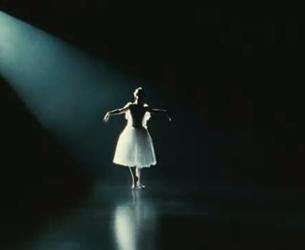Staring Natalie Portman, Mila Kunis, Vincent Cassel and
Winona Ryder, Black Swan was called by The Boston
Phoenix, “a symphony of opposites.” Directed by Darren Aronofsky, the film
was dark as always and therefore rated R. It was released nationwide on
December 17, 2010.
Black Swan is a story of a ballerina, Nina
(Portman), who dances for the New York City Ballet Company and desires to win
the lead role of the swan queen in the upcoming performance of Swan
Lake. Thomas (Cassel), the company’s director, forces Beth (Ryder), who has
long been the queen of the company, to retire. He then gives the role of the
swan queen to Nina, regardless of the fact that she danced poorly in her
audition.
Thomas decided to do a rendition of the classic ballet,
where he casts the white swan and the black swan as the same person. The white
swan is beautiful, frail and good where the black swan is seductive, wild and
evil. He encourages Nina to lose control and stop trying to be a perfect dancer
when she plays the black swan. There is also a new dancer in the company, Lily
(Kunis), who is just what Thomas desires the part of the black swan to be.
As Nina seeks to embrace her inner black swan, she begins to
lose control to the point of madness. She literally becomes the dual
personality that Thomas’ ballet is trying to impress, the white and black swan
intertwined into one person.
This movie is packed full of interesting themes and here are
a few.
First, there is an idea that childishness and weakness are
associated with goodness, and adult-like activities and strength are associated
with evil.
In the beginning, Nina is the perfect white swan. She lives
with her mother late into her twenties and she still has a cute pink bedroom
filled with stuffed animals. Her mother always comes to her room to say
goodnight at bedtime. Nina doesn’t have a boyfriend or any sexual desires
toward anyone. She holds her mother in high regard and always obeys her.
However, as the movie progresses and she begins to transform
into the black swan, she goes out to a club with Lily and she gets drunk and
high and has sex with a few guys. She comes home late into the night and after
a disrespectful conversation with her concerned mother, Nina goes with Lily to
her room and they have lesbian sex. I noted that these are the only scenes in
the entire movie where Nina doesn’t look stressed, worried and scared; she was
strong.
This leads to the second theme. Although one would think
that loosening up would do Nina some good, it ends up destroying her. As Nina
begins to “grow up” and “live a little”, she also begins to have severe
hallucinations and she starts cutting herself, mistreating and harming her
mother and hallucinating homicides. She also simultaneously becomes much more
sexually appealing to her director.
 |
| Nina as the black swan |
Towards the beginning of the film, Thomas is talking about
why Beth was so interesting to watch as a dancer. He said that it was because
she had such a dark side but “she is so damn destructive” and this is why he
had to make her retire. Her destructive nature made Beth a great dancer, yet it
ruined her character, and at the end of the movie, Nina comes to the same fate.
Another interesting factor in the film was that Nina had no
one to turn to with her troubled mind. Lily offered to listen to Nina a few times
and she even stood up for Nina to Thomas and Nina’s controlling mother. Nina
let go of the controls in some areas of her life, but she never let anyone
inside her head, to help her deal with the intense pressure that the ballet was
pressing on her. There is this irony of Nina being so in control, yet so
utterly helpless to all the chaotic events that are spiraling in life.
In a violent scene with her mother who is trying to
encourage her to give up the part of the black and white swan, her mother
cries, “What happened to my sweet girl?” to which Nina replies, “She’s gone.”
Nina traded her “good”, up-tight self, for her destructive, wild counter ego.
 |
| Nina as the white swan |
Nina let go of her control by giving in to the evil
force that was tormenting her. At the end of the movie, she kills herself, just
like the white swan does at the end of Swan Lake. Perhaps this is a
picture of the way that she killed the “sweet little girl” in order to become
the black swan.
Over all, if you are not easily creeped out by bizarre and
disturbing images, you are not offended by homosexual sex scenes, and you like
films that play with your mind, then you will probably enjoy this movie.

I really like this :D But I don't know if you noticed in the film that she was cutting herself and harming her body while she was the white swan as well. Really the main thing that changes when she became the black swan is how much more sexual she becomes with the help of her two sexual interests, Thomas and Lily. She wanted to be perfect for Thomas even if that meant she had to change her opinion of what perfection is. And she knew that he loved the way Lily danced so she chose to embrace more of her life style. She literally didn't have a personality at all really. She constantly was trying to be other people. She was trying to be Beth at the beginning and then by the end she was trying to be Lily. Ultimately she ended up dead because she couldn't just figure out who she was. ~Deanna
ReplyDelete